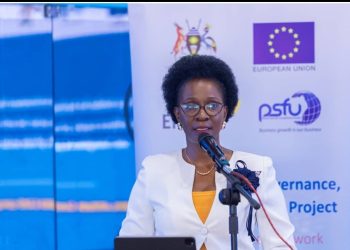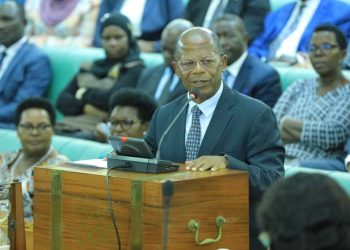Deputy Attorney General Mwesigwa Rukutana yesterday made a case for Parliament to reject attempts by the opposition to table constitutional reforms, labeling the whole exercise “vain and unconstitutional.”
Rukutana made the argument during a debate by the House to consider granting shadow attorney general Wilfred Niwagaba (Ndorwa East) leave to table the Constitutional (Amendment) Bill, 2019.
The Bill is consolidated with that of Paul Mwiru (Jinja Municipality East). The kernel of Rukutana’s objection to the Bill was two-pronged.
The first limb was the alleged unconstitutionality of the House entertaining a piece of legislation which has the impact of imposing a charge on the consolidated fund without the explicit approval of the Executive.
The second limb of his argument was whether Parliament was not going against a resolution adopted in 2015, during which the House made explicitly clear that all pending amendments of the Constitution be handled by a Constitutional Review Commission (CRC).
“We do not debate or handle motions in vain. We need to make decisions that are logical and enforceable,” Rukutana said, spawning a heated rebuttal from opposition benches.
Former opposition Chief Whip Cecilia Ogwal described Rukutana’s concerns as premature. According to Ogwal, the need for a certificate of financial implication as required by Article 93 of the Constitution will be necessary at the time of debating the Bill.
However, it was Muwanga Kivumbi and shadow minister of justice, Medard Sseggona who made a case for lawmakers on the ruling party benches to view the proposed constitutional amendments through the prism of securing Uganda’s democratic gains.
“At every turn of our country’s history, disputed elections have harmed our progress. Having good electoral laws is an investment into a democratic and stable country,”
Kivumbi
Niwagaba and Mwiru’s Bill seeks to address some of the most contentious issues that have turned every election contestation into a veritable battleground on account of the fairness of the process.
Deputy Speaker Jacob Oulanyah told the House that Rukutana’s concerns are “involving and consequential” needing time to reflect upon before giving proper guidance. However, he did not specify to the House when he would do so.
Among the provisions that the Bill seeks to address is the composition and appointment of Electoral Commission (EC) commissioners and streamlining the role of the military in the election process.
The piece of legislation also seeks to alter the character of the leadership of Parliament by creating a speakers’ panel as the case is in other commonwealth jurisdictions. In case the speaker or her/his deputy is out of the country, one of the lawmakers belonging to the Speakers’ Panel can preside over the House, to handle issues that are not contentious.
In his justification for the Bill, Niwagaba reminded the House of the concerns of the Supreme Court justices regarding the fairness of the electoral process in the Dr. Kizza Besigye and Amama Mbabazi presidential election petitions in 2006 and 2016, respectively.
In the two petitions, the justices questioned the role of the military in elections, the dabbling of civil servants in partisan politics during elections and donations made during the election period. Last week, Attorney General William Byaruhanga tabled a raft of amendments to the legal regime governing elections in the country.
However, the opposition and members of the civil society were quick to label them a ‘joke’, saying they fall short of addressing the core concerns that have proved contentious at every election cycle.
Proposed Amendments
- Scrapping RDCs
- Limiting ministers to only 21
- Restoration of presidential term limits
- EC commissioners to be nominated by Judicial Service Commission
- Replacing Vice President with Deputy President
- Providing for a Speaker’s Panel
- Involving the parliamentary commissioner in the appointment of Clerk to Parliament
- Scrapping the requirement for public servants to resign their jobs before contesting for political offices
- Scraping representation of the army in parliament
- Prohibit appointment of ministers from among Members of Parliament































































